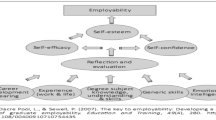Abstract
Unemployment exists due to lack of jobs available in the market. With large number of graduating students per year, the competition to get job becomes fiercer. In order to remain competitive, it is essential for the prospective employees to know the reasons why companies reject certain job applications. Surprisingly, the job applications from some students with excellent academic performance can also be rejected. Hence, to further understand this scenario, 124 questionnaires have been distributed to 100 companies in Malaysia who were having experience in training undergraduate students from one of the public universities in Malaysia for five months during their final semester. The managers of the companies were asked to evaluate the performance of the graduating students especially in terms of their skills and qualities by using Likert Scale. All questionnaires were emailed directly via the platform of Google Drive to the managers who were selected based on their role as the immediate supervisors of the trainees. All data received were then analyzed by using SPSS software. The findings show that both graduate qualities and skills play important roles in helping students to get job. However, the students with good qualities are more preferable even if they have lack of skills. Moreover, low motivational level, lack of creativity and leadership values, lack of language proficiency skills, and lack of problem solving were identified as among the major weaknesses of the students since they received scores below than its par. Hence, it is suggested that all university courses need to integrate those elements in the teaching and learning process.
Access this chapter
Tax calculation will be finalised at checkout
Purchases are for personal use only
Similar content being viewed by others
References
Carroll, D., & Tani, M. (2013). Over-education of recent higher education graduates: New Australian panel evidence. Economics of Education Review, 32, 207–218.
Cheung, C.-K., & Ngai, N.-P. (2010). Training to raise unemployed youth’s work commitment in Tianjin. Children and Youth Services Review, 32, 298–305.
Dabalena, A., Onib, B., & Adekolac, O. A. (2001). Labor market prospects for university graduates in Nigeria. Higher Education Policy, 14, 141–159.
Department of Statistics. (2011). Statistics of graduates in the labour force Malaysia 2011. Retrieved from http://www.statistics.gov.my/portal/download_Labour/files/BPTMS/PERANGKAAN_%20SISWAZAH_2011.pdf
Ji, Y. (2013, July 27). Close to half of Malaysian graduates either jobless or employed in mismatched fields. The Star.
Kelly, N. (2014). As the internet becomes more global, language matters more than ever. Huff Post. Retrieved from http://www.huffingtonpost.com/nataly-kelly/as-the-internet-becomes-m_b_5478604.html
Klein, C. R. (2009). What do we know about interpersonal skills? A meta-analytic examination of antecedents, outcomes and the efficacy of training. Florida: University of Central Florida.
Krisha, P., Tamby Subahan, M. M., Kamisah, O., & Zanaton, I. (2012). Are UKM graduates ready to face challenges on the job market? Procedia—Social and Behavioural Sciences, 59, 584–590.
Kulasagaran, P. (2013). More SPM students score straight A’s. The Star.
Lim, H.-E. (2010). Predicting low employability graduates: The case of Universiti Utara Malaysia. The Singapore Economic Review, 55(3), 523–535.
Menon, M. E., Pashaourtidou, N., Polycarpou, A., & Pashardes, P. (2012). Students’ expectations about earnings and employment and the experience of recent university graduates: Evidence from Cyprus. International Journal of Educational Development, 32, 805–813.
Ministry of Higher Education. (2012). The national graduate employability blueprint 2012–2017. Retrieved from http://jpt.mohe.gov.my/PENGUMUMAN/GE%20blueprint%202012-2017.pdf
Nor Hartini, S. (2012). Unemployed graduates: How can we address this situation? Retrieved July 16, 2014, from http://www.ikim.gov.my/index.php/en/artikel/7650-unemployed-graduates-how-can-we-address-this-situation
Nor Intan Saniah, S., & Burke, M. (2009). A case analysis of knowledge sharing implementation and job searching in Malaysia. International Journal of Information Management, 29, 321–325.
Rahmah, I., Ihak, Y., & Seing, L. W. (2011). Employers’ perception on graduate in Malaysian services sector. International Business Management, 5(3), 184–193.
Salina, D., Nurazariah, A., Noraina, M. S., & Rajadurai, J. (2010). Enhancing university business curriculum using an importance-performance approach: A case study of the business management faculty in Malaysia. International Journal of Educational Management, 25(6), 545–569.
Singh, P., Thambusamy, R. X., & Mohd Adlan, R. (2014). Fit or unfit? Perspectives of employers and university instructors of graduates’ generic skills. Procedia—Social and Behavioural Sciences, 123(20), 315–324.
Teijeiro, M., Rungo, P., & Freirea, M. J. (2013). Graduate competencies and employability: The impact of matching firms’ needs and personal attainments. Economics of Education Review, 34, 286–295.
The Star. (2014, May 27). Malaysia’s unemployment rate down to 3pc in March. The Star.
Velasco, M. S. (2011). More than just good grades: Candidates’ perceptions about the skills and attributes employers seek in new graduates. Journal of Business Economics and Management, 13(3), 499–517.
Zaliza, H., & Mohd Safarin, N. (2013). Unemployment among Malaysia graduates: Graduates’ attributes, lecturers’ competency and quality of education. Amsterdam: Elsevier.
Author information
Authors and Affiliations
Corresponding author
Editor information
Editors and Affiliations
Rights and permissions
Copyright information
© 2016 Springer Science+Business Media Singapore
About this paper
Cite this paper
Abd Rahman, N.H., Omar, H., Mustafa, T., Jusoh, Z., Romaiha, N.R. (2016). Graduate Employability: What Went Wrong?. In: Abdullah, M., Yahya, W., Ramli, N., Mohamed, S., Ahmad, B. (eds) Regional Conference on Science, Technology and Social Sciences (RCSTSS 2014). Springer, Singapore. https://doi.org/10.1007/978-981-10-1458-1_30
Download citation
DOI: https://doi.org/10.1007/978-981-10-1458-1_30
Published:
Publisher Name: Springer, Singapore
Print ISBN: 978-981-10-1456-7
Online ISBN: 978-981-10-1458-1
eBook Packages: Social SciencesSocial Sciences (R0)




